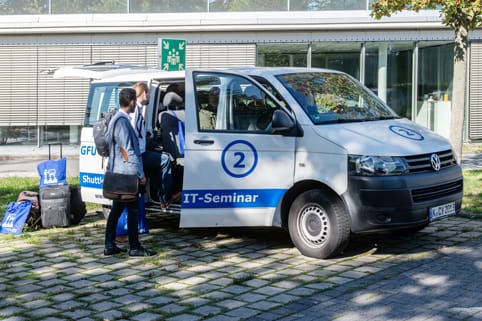Bitte wählen Sie die Bereiche, die Sie exportieren möchten:
Schulung LFS458 Kubernetes Administration with Effective Exam Preparation
Schulungsformen
Offene Schulung
- 4 Tage
- 3 gesicherte Termine
- 2.530,00 p. P. zzgl. MwSt.
- Köln / Online
- Online oder Präsenz
- Dritter Mitarbeitende kostenfrei
Inhouse-/Firmenschulung
- 4 Tage - anpassbar
- Termin nach Wunsch
- Preis nach Angebot
- In Ihrem Hause oder bei der GFU
- Online, Präsenz oder Hybrid
- Lernumgebung in der Cloud
Individualschulung
- 4 Tage - anpassbar
- Termin nach Wunsch
- Preis nach Angebot
- In Ihrem Hause oder bei der GFU
- Online, Präsenz oder Hybrid
- Lernumgebung in der Cloud
Beschreibung
- Improved Efficiency and Productivity: Kubernetes administrators have the skills and knowledge to effectively manage and operate Kubernetes clusters. They can streamline deployment processes, automate tasks, and optimize resource utilization, leading to increased efficiency and productivity within the company.
- Enhanced Application Availability and Scalability: With Kubernetes administrators, companies can ensure high availability and scalability of their applications. Administrators can manage deployments, scale resources based on demand, and implement load balancing and auto-scaling techniques to meet application requirements.
- Reduced Downtime and Faster Issue Resolution: Certified administrators are well-equipped to troubleshoot and resolve issues that arise in Kubernetes environments. They can identify and address performance bottlenecks, network connectivity problems, and configuration errors, minimizing downtime and improving the overall stability of the applications.
- Cost Optimization: Kubernetes administrators can optimize resource allocation and utilization, ensuring that resources are allocated efficiently and wastage is minimized. This can lead to cost savings for the company by eliminating unnecessary resource consumption and scaling resources based on demand.
- Security and Compliance: Certified administrators understand best practices for securing Kubernetes clusters and implementing RBAC, network policies, and encryption. They can enforce security measures, monitor cluster activities, and ensure compliance with industry regulations and standards, safeguarding company data and assets.
- Adoption of Modern Technologies: Kubernetes has become the de facto standard for container orchestration. Having certified administrators allows companies to adopt modern cloud-native technologies and take advantage of the benefits of containerization, microservices, and scalable infrastructure.
- Attraction and Retention of Talent: Offering opportunities for employees to get certified in Kubernetes administration can attract top talent and help retain skilled professionals within the company. It demonstrates a commitment to professional development and keeps employees engaged and motivated in their roles.
Schulungsziel
Companies' goals in Kubernetes administration include:
- Efficient application deployment
- Scalability and availability
- Resource optimization
- Robust and secure infrastructure
- Efficient troubleshooting and issue resolution
- Automation and DevOps integration
- Cost optimization
- Agility and innovation
Details
Wer teilnehmen sollte
The following professionals can benefit from attending:
- System Administrators: Those responsible for managing and maintaining infrastructure and systems, including Kubernetes clusters, within an organization.
- DevOps Engineers: Professionals involved in the development and deployment of applications, who require knowledge of Kubernetes to optimize their deployment pipelines.
- Cloud Administrators: Individuals managing cloud-based environments and seeking to leverage Kubernetes for container orchestration.
- Site Reliability Engineers (SREs): SREs responsible for ensuring the reliability, performance, and availability of applications running on Kubernetes.
- IT Managers and Team Leads: Managers overseeing Kubernetes infrastructure and teams, seeking to gain a comprehensive understanding of Kubernetes administration.
- Application Developers: Developers interested in deploying and managing their applications using Kubernetes, understanding the operational aspects involved.
- Infrastructure Architects: Architects designing and implementing infrastructure solutions that leverage Kubernetes for scalability and resiliency.
- IT Operations Professionals: IT personnel involved in the operational aspects of managing and monitoring Kubernetes clusters.
Ihre Schulung
Präsenz-Schulung | Online-Schulung |
|---|---|
| Lernmethode | |
Ausgewogene Mischung aus Theorie und Praxis | Wie auch bei unseren Präsenz-Seminaren: Ausgewogene Mischung aus Theorie und praktischen Übungen. Trainer durchgehend präsent. |
| Unterlagen | |
Seminarunterlagen oder Fachbuch zum Seminar inklusive, das man nach Rücksprache mit dem Trainer individuell auswählen kann. | Seminarunterlagen oder Fachbuch inklusive (per Post). Das Fachbuch wählt der Trainer passend zum Seminar aus - Ihren individuellen Buch-Wunsch berücksichtigen wir auf Nachfrage gerne. |
| Arbeitsplatz | |
| PC/VMs für jeden Teilnehmenden Hochwertige und performante Hardware Große, höhenverstellbare Bildschirme Zugang zu Ihrem Firmennetz erlaubt |
|
| Lernumgebung | |
| |
| Arbeitsmaterialien | |
DIN A4 Block, Notizblock, Kugelschreiber, USB-Stick, Textmarker, Post-its | |
| Teilnahmezertifikat | |
Die Teilnahmezertifikat inkl. Inhaltsverzeichnis wird Ihnen am Ende des Seminars ausgehändigt. | Die Teilnahmezertifikat inkl. Inhaltsverzeichnis wird Ihnen per Post zugesandt. |
Organisation
Präsenz-Schulung | Online-Schulung | |
|---|---|---|
| Teilnehmendenzahl | ||
min. 1, max. 8 Personen | ||
| Garantierte Durchführung | ||
Ab 1 Teilnehmenden* | ||
| Schulungszeiten | ||
| ||
| Ort der Schulung | ||
 GFU Schulungszentrum GFU SchulungszentrumAm Grauen Stein 27 51105 Köln-Deutz oder online im Virtual Classroom oder europaweit bei Ihnen als Inhouse-Schulung Um ein optimales Raumklima zu gewährleisten, haben wir das Schulungszentrum mit 17 hochmodernen Trotec TAC V+ Luftreinigern ausgestattet. Diese innovative Filtertechnologie (H14 zertifiziert nach DIN EN1822) sorgt dafür, dass die Raumluft mehrfach pro Stunde umgewälzt wird und Schadstoffe zu 99.995% im HEPA-Filter abgeschieden und infektiöse Aerosole abgetötet werden. Zusätzlich sind alle Räume mit CO2-Ampeln ausgestattet, um jederzeit eine hervorragende Luftqualität sicherzustellen. | ||
| Räumlichkeiten | ||
Helle und modern ausgestattete Räume mit perfekter Infrastruktur | Bequem aus dem Homeoffice von überall | |
| Preisvorteil | ||
Dritter Mitarbeitende nimmt kostenfrei teil. Eventuell anfallende Prüfungskosten für den dritten Teilnehmenden werden zusätzlich berechnet. Hinweis: Um den Erfolg der Schulung zu gewährleisten, sollte auch der dritte Teilnehmende die erwarteten Vorkenntnisse mitbringen. | ||
| All-Inclusive | ||
Gebäck, Snacks und Getränke ganztägig, Mittagessen im eigenen Restaurant, täglich 6 Menüs, auch vegetarisch | Eine Auswahl unserer Frühstücks-Snacks und Nervennahrungs-Highlights senden wir Ihnen mit den Seminarunterlagen per Post zu. | |
| Barrierefreiheit | ||
Das GFU-Schulungszentrum (Am Grauen Stein 27) ist barrierefrei | - | |
Buchen ohne Risiko
| Rechnungsstellung |
Erst nach dem erfolgreichen Seminar. Keine Vorkasse. |
| Stornierung |
Kostenfrei bis zum Vortag des Seminars |
| Vormerken statt buchen |
Sichern Sie sich unverbindlich Ihren Seminarplatz schon vor der Buchung - auch wenn Sie selbst nicht berechtigt sind zu buchen |
Kostenfreie Services
Präsenz-Schulung | Online-Schulung |
|---|---|
|
|
Inhalt
- Containerization and orchestration overview
- Kubernetes architecture and components
- Installing and configuring a Kubernetes cluster
- Creating and managing Pods
- Configuring Pod networking and storage
- Scaling applications with Deployments
- Creating and managing Services
- Implementing service discovery and load balancing
- Configuring network policies and Ingress controllers
- Understanding storage options in Kubernetes
- Creating and managing Persistent Volumes and Persistent Volume Claims
- Configuring dynamic volume provisioning
- Working with ConfigMaps and Secrets
- Managing environment variables in Pods and Deployments
- Using Helm for package management and deployment
- Implementing monitoring and metrics collection with Prometheus and Grafana
- Configuring logging with fluentd and Elasticsearch
- Troubleshooting and optimizing cluster performance
- Implementing RBAC (Role-Based Access Control)
- Securing cluster communication with TLS certificates
- Enforcing security policies with Pod Security Policies
- Performing cluster upgrades and rolling updates
- Configuring multi-master setups and node redundancy
- Planning for disaster recovery and backup strategies
- Identifying and resolving common issues and errors
- Troubleshooting networking and application problems
- Debugging Pods and examining container logs
- Implementing advanced networking features, such as Network Policies and Ingress controllers
- Exploring service mesh technologies like Istio and Linkerd
- Implementing Horizontal Pod Autoscaling (HPA)
- Managing resource quotas and limits
- Understanding cluster resource utilization and optimization
- Exploring Kubernetes federation for managing multiple clusters
- Configuring and managing multi-cluster deployments
- Reviewing key concepts and exam topics
- Practicing with sample exam questions and scenarios
- Q&A session and clarifications
Which component of Kubernetes is responsible for scheduling Pods to run on available nodes?
a) kube-apiserver
b) kube-scheduler
c) kube-controller-manager
d) kubelet
How can you scale a Deployment named "web-app" to have four replicas?
a) kubectl scale deployment web-app --replicas=4
b) kubectl resize deployment web-app --replicas=4
c) kubectl update deployment web-app --replicas=4
d) kubectl apply -f web-app-deployment.yaml --replicas=4
What is the purpose of a Persistent Volume Claim (PVC) in Kubernetes?
a) To request storage from a Persistent Volume (PV)
b) To define storage classes for dynamic volume provisioning
c) To configure network policies for communication between Pods
d) To expose a Pod externally using a Service
Which Kubernetes resource is used to expose a set of Pods as a single, stable network endpoint?
a) Deployment
b) ReplicaSet
c) Service
d) Ingress
How can you enable RBAC (Role-Based Access Control) in a Kubernetes cluster?
a) By setting the --enable-rbac flag when starting the kube-apiserver
b) By configuring RBAC rules in the kube-apiserver configuration file
c) By creating a ClusterRole and binding it to a user or group
d) RBAC is enabled by default and cannot be disabled
Which tool can be used to monitor and collect metrics from a Kubernetes cluster?
a) Prometheus
b) Fluentd
c) Elasticsearch
d) Kibana
How can you upgrade a Kubernetes cluster using kubeadm?
a) kubeadm upgrade cluster
b) kubeadm upgrade apply
c) kubeadm upgrade node
d) kubeadm upgrade kubelet
What is the purpose of an Ingress controller in Kubernetes?
a) To manage and configure network policies for Pods
b) To provide load balancing and reverse proxy functionality
c) To monitor and collect metrics from the cluster
d) To manage and distribute container images
Which Kubernetes object is used to automatically provision and manage SSL/TLS certificates for Services?
a) Deployment
b) Ingress
c) ServiceAccount
d) ConfigMap
How can you view the logs of a specific Pod in Kubernetes?
a) kubectl get logs pod-name
b) kubectl logs pod-name
c) kubectl describe pod pod-name
d) kubectl exec pod-name logs
Buchungsmöglichkeiten
Online oder in Präsenz teilnehmen
Sie können sowohl Online als auch in Präsenz am Seminar teilnehmen. Klicken Sie bei Ihrer Buchung oder Anfrage einfach die entsprechende Option an.
Gesicherte offene Termine
| Termin | Ort | Preis | |
|---|---|---|---|
| 10.03.-13.03.2025 Plätze vorhanden Köln / Online 2.530,00 | Köln / Online | 2.530,00 | Buchen Vormerken |
| 12.05.-15.05.2025 Plätze vorhanden Köln / Online 2.530,00 | Köln / Online | 2.530,00 | Buchen Vormerken |
| 14.07.-17.07.2025 Plätze vorhanden Köln / Online 2.530,00 | Köln / Online | 2.530,00 | Buchen Vormerken |
Inhalte werden auf Wunsch an die Anforderungen Ihres Teams angepasst.
- Online, Präsenz oder Hybrid
- Komplette Lernumgebung in der Cloud mit Remote Zugriff
Fokus aufs Fachliche und maximaler Raum für individuelle Fragen.
- Online, Präsenz oder Hybrid
- Komplette Lernumgebung in der Cloud mit Remote Zugriff
Unterstützung nach der Schulung durch
individuelle Nachbetreuung
- Alle folgenden Schulungsformen können auch Online als Virtual Classroom durchgeführt werden.
- Eine Offene Schulung findet zu einem festgelegten Zeitpunkt im voll ausgestatteten Schulungszentrum oder Online/Remote statt. Sie treffen auf Teilnehmende anderer Unternehmen und profitieren vom direkten Wissensaustausch.
- Eine Inhouse-/Firmen-Schulung geht auf die individuellen Bedürfnisse Ihres Unternehmens ein. Sie erhalten eine kostenfreie Beratung von Ihrem Seminarleiter und können Inhalte und Dauer auf Ihren Schulungsbedarf anpassen. Inhouse-Schulungen können Europaweit durchgeführt werden.
- Bei einer Individual-Schulung erhalten Sie eine 1-zu-1 Betreuung und bestimmen Inhalt, Zeit und Lerntempo. Der Dozent passt sich Ihren Wünschen und Bedürfnissen an.
Sie können unsere Schulungen auch als Remote Schulung im Virtual Classroom anfragen.
In drei Schritten zum Online Seminar im Virtual Classroom:
- Seminar auswählen und auf "Buchen" klicken
- Wählen Sie bei "Wie möchten Sie teilnehmen?" einfach "Online" aus.
- Formular ausfüllen und über den Button "Jetzt buchen" absenden.
Unser Kundenservice meldet sich bei Ihnen mit der Buchungsbestätigung.
Unsere Online Schulungen finden im Virtual Classroom statt. Ein Virtual Classroom bündelt mehrere Werkzeuge, wie Audio-Konferenz, Text-Chat, Interaktives Whiteboard, oder Application Sharing.
Vorteile von Virtual Classroom:
- Sie erhalten 1 zu 1 die gleiche Lernumgebung, die Sie auch vor Ort bei uns vorfinden
- Die technische Vorbereitung wird von den GFU-Technikern vorgenommen
- Sie erhalten remote Zugriff auf Ihren persönlichen Schulungs-PC im GFU-Seminarraum
- Die Virtual Classroom Lösung lässt sich auch im Browser betreiben
- Die GFU-Technik leistet wie gewohnt Soforthilfe bei Problemen
- Die Schulungsunterlagen bekommen Sie per Post zugeschickt
- Sie sparen Reisekosten und Zeit
- 10. Mär. - 13. Mär. ✓ Noch einige Plätze frei ▶ Köln + Online/Remote
- 12. Mai - 15. Mai ✓ Noch einige Plätze frei ▶ Köln + Online/Remote
- 14. Jul. - 17. Jul. ✓ Noch einige Plätze frei ▶ Köln + Online/Remote
- Auch als Inhouse-Schulung, bundesweit mit Termin nach Wunsch und individuellen Inhalten
- Buchen ohne Risiko! Kostenfreie Stornierung bis zum Vortag des Seminars
Buchen Sie diese kostenfreien Serviceleistungen für Präsenzseminare ganz einfach während des Buchungsprozesses dazu!

Machen Sie sich keinen Kopf um die Anreise! Unser Shuttle fährt Sie. Oder Sie parken einfach auf einem extra für Sie reservierten Parkplatz.

Hotelzimmer gesucht? Wir organisieren Ihnen eins. Ihr Vorteil: Sie sparen Zeit und Geld!

Gesund oder lecker? Warum nicht beides? Freuen Sie sich auf unsere kulinarische Verpflegung!

Parkplätze sind in ausreichender Zahl vorhanden. Reisen Sie mit dem Auto an, reservieren wir Ihnen einen Parkplatz.